
Healthcare Content Marketing: How to Do It Right (With Examples)
Healthcare content marketers have a heavy burden. They deal with complex subjects and topics and strive to connect with sophisticated buyers. With all the challenges they face, they still do their best to create value for audiences and generate leads for their businesses.
That said, content is an incredibly effective marketing channel for healthcare organizations. Users search Google for health-related questions over 1 billion times each day, accounting for around 7 percent of the search engine’s total search queries.
Research from Google shows that content is critical in the patient journey to researching and choosing a health facility. And, most patients start with general informational searches, rather than branded searches to find out more about a particular clinic or healthcare facility.
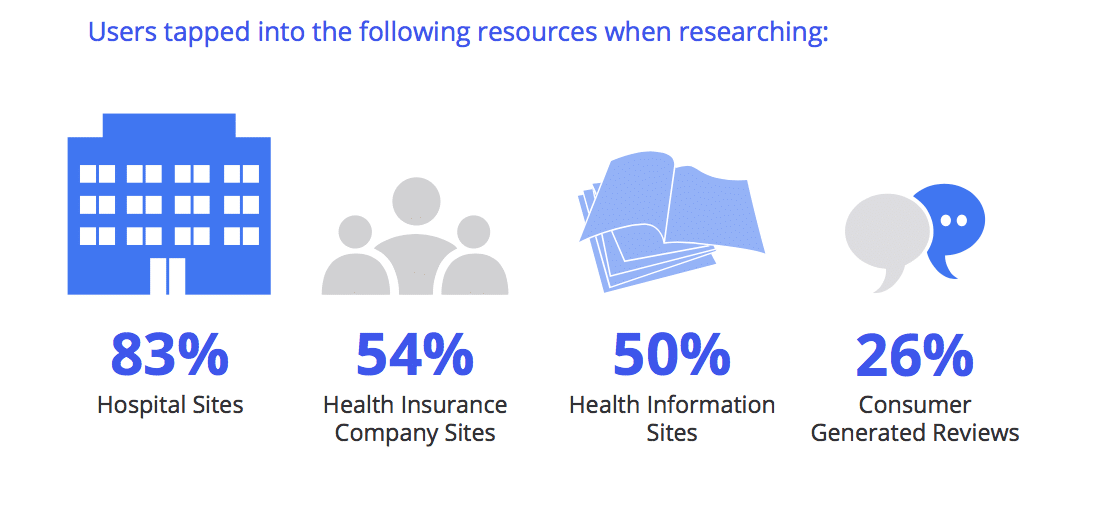
However, not all healthcare organizations are excelling at content marketing or convinced of its importance. Many hospitals are still spending the bulk of their marketing budget on traditional marketing channels, and while digital spend is increasing, it’s more commonly spent on ads rather than content.
To get an idea of the true power of content marketing for health-related businesses, it can be helpful to look at some case studies of organizations that have achieved massive success at online marketing, primarily through content.
We have always needed healthcare companies to create the innovative products and services to help us deal with life’s ailments. But aside from a few notable exceptions, healthcare companies have not exactly been leaders in Content Marketing.
Now is the time for the leaders in the healthcare field to realize that sharing what they know is just important and delivering their products and services.
Quick Takeaways:
- Healthcare content marketing is complex because of the topics and buyers.
- Content marketing must deliver timely, reliable, and relevant information your customers or patients need to make decisions.
- Most healthcare organizations use content marketing, but they struggle with strategy and measuring ROI.
- Make sure that your content answers simple questions on the minds of your target audience. Emotional marketing, storytelling, and accuracy will help you connect better with them.
- Optimize for mobile to better meet your customers’ and patients’ needs for quick information in a crisis.
- Content marketers in healthcare have special considerations due to regulations, compliance, and privacy.
What’s the State of Content Marketing in Healthcare?
Before we dive into the good stuff, it’s helpful to get the lay of the land. The 2020 State of Healthcare Content Marketing report provides some valuable information. The study surveyed content leaders and executives at hospitals across the country.
Most healthcare organizations are actively engaged in content marketing, at 89 percent. The researchers stated this is a 13 percent increase over 2019. It’s possible the pandemic provided the time and acceleration for greater adoption.
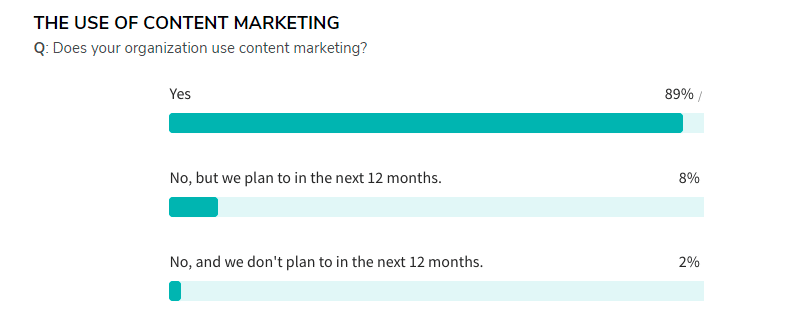
The study revealed that content marketers use various channels and tactics to engage, attract, and convert. The top ones were social media content, blogs, videos, newsletters, illustrations, and infographics.
Healthcare content marketers did shift their content strategy in response to COVID-19. Most companies said they began to focus more on education around COVID-19 prevention and care.
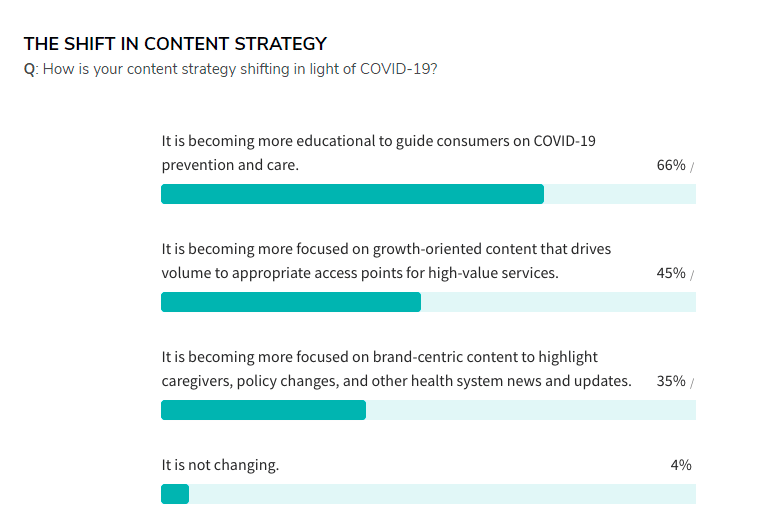
Most organizations feel their content marketing is effective, with a cumulative 92 percent saying it was somewhat or very. That’s a 7 percent decrease from the year prior.
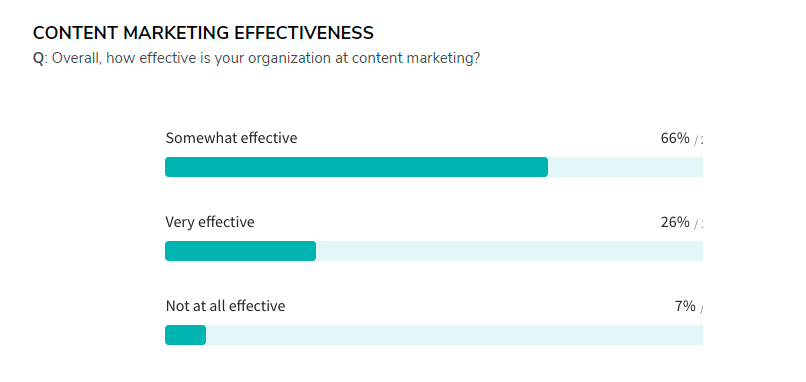
Very few have a documented content strategy, at only 28 percent. This is a big gap for the industry and certainly impacts the effectiveness of content marketing. They also struggle somewhat with content marketing ROI, with 23 percent saying they aren’t successful and 9 percent not tracking it at all!
Why Should Healthcare Use Content Marketing?
Content marketing is a strategy that applies to any industry or audience. Healthcare is no different, but the approaches are often different. The sector is also vast and ranges from providers and payors communicating with consumers to B2B brands that offer healthcare organizations technology, supplies, tools, and more.
However, all these niche segments present opportunities. By consistently publishing relevant, high-quality content, you can attract your audience. Not only will they find you if they search, which is how most buyers begin their journey, but you can also illustrate your experience and expertise through thought leadership.
The crux is to do healthcare content marketing right, and to do that you need to:
- Be accurate always: If you’re talking about technical aspects, regulations like HIPAA, or other compliance-related content, you have to avoid fluff and be specific.
- Understand your buyer: In the case of B2B, those buying your products are physicians, payors, pharma, IT experts, and other specialized roles. You need to understand their pain points, what matters to them, and how you can deliver solutions. This is more complex in the healthcare industry because of compliance and regulations.
- Use data to support angles: Whatever points you make in your content, you’ll need reputable sources to back it up. Misinformation and disinformation are a dark cloud in healthcare right now, and if you want to build trust with your customers, you should use factual and proven data.
- Realize that healthcare’s immediate focus is on COVID-19: Most of the world’s priority is the pandemic. Healthcare is one of the biggest stakeholders. All your content now should consider the pandemic and its effects, even if it’s not specific to your product or service.
- Answer questions with clarity: To build credibility, along with supporting data, you have to be clear. There’s no room for ambiguity in this content.
- Tell stories that matter: Storytelling is critical for any brand. Healthcare content can bring real-life stories to audiences that can cause emotional responses.
In a crisis, customer experience needs to be your highest priority, as Jodi Harris points out. Specifically, people need timely, reliable, and relevant – even personalized – information that they can act on immediately.
Providing hope while standing firmly on science – that’s the content tightrope you need to walk during a crisis. Here are some ways to meet those demands.
Healthcare Is Playing Catch Up
Another point to discuss in content marketing for healthcare is that the vertical is behind. It simply isn’t as mature as other fields like technology but also similarly regulated industries like Financial Services.
Even though the study cited earlier shows that most healthcare organizations are using content, they haven’t perfected their processes, planning, or strategies. Many don’t even have a content hub!
However, the last year caused a boost in digitization and transformation across the industry. Healthcare has always been a trade show and event heavy sector, and that went out the window. You could reallocate that budget and time to content and digital marketing initiatives.
If you’re new to the vertical or felt held back before, there is an opportunity for you to recalibrate and refocus energies on content marketing, which could lead to more engagement, conversions, and profits.
Start with the Questions Your Customers and Patients Will Likely Ask
Google has always aimed to provide clear answers with knowledge panels for medical and health-related search queries.
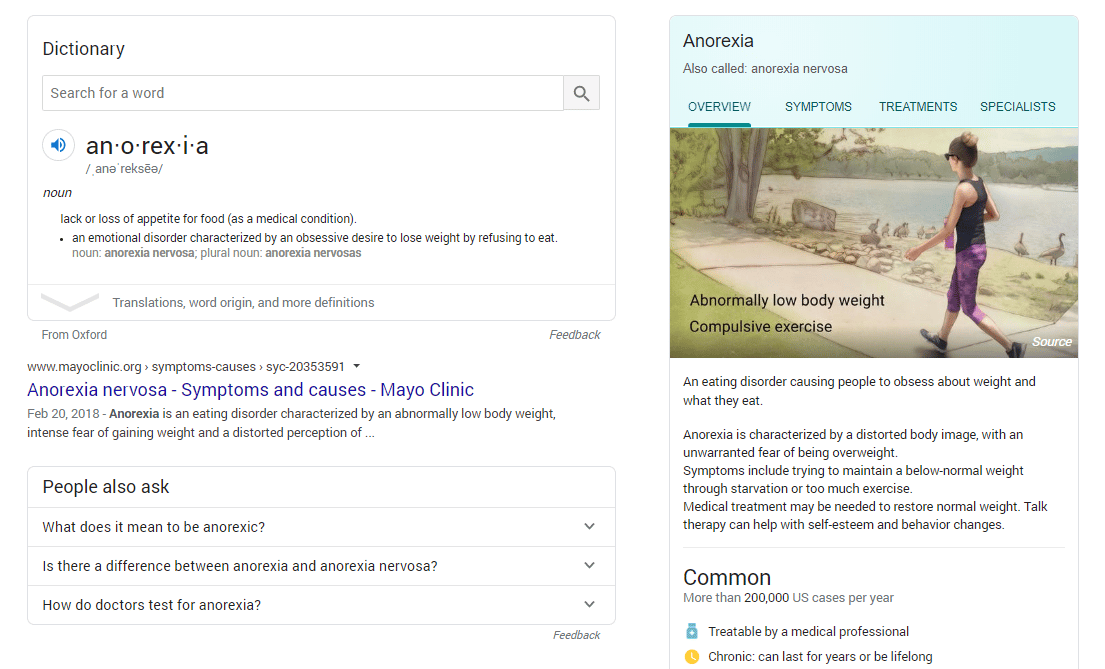
With the rise of voice search, search engine algorithms have moved toward natural language searches. While some people might still search for “ventilators Florida” or “emergency telemedicine California,” today’s customers are more likely to ask Siri instead, using questions like “Where can my hospital find ventilators in Florida?” or “Does Anthem offer telemedicine visits in California?”
Though we usually associate SEO with a content marketing strategy to sell more *stuff*, it has a practical side, particularly during uncertain times. Both consumers and businesses want immediate relief. The faster they can find that relief, the more quickly they can get back to normal life.
Optimizing your healthcare company’s SEO – whether you’re a B2B company or a direct B2C caregiver – is the best way for you to be the first goods or services provider people will find. Answering the kinds of questions your patients or customers are likely to ask is the key to top the search results at “position zero,” appearing even above ads.
That’s where enterprise content strategy intersects with effective leadership – and it’s what healthcare companies need in times of uncertainty. It’s where yours needs to be now.
Make Sure that Your Content Matches the Promise in the Meta Description
Content marketing during uncertain times must make good on the promise people read in your meta description. Nothing is more frustrating than to read an enticing description, only to find generic filler content designed for search engines, not people.
Especially in a crisis. People looking for solutions to their problems, only to find a glorified ad, will be furious to have wasted their time on self-promotional drivel. You can be sure that after the crisis passes, they’ll pass the word around about how unhelpful your brand was.
B2C
Instead, make sure that you deliver even more information than your meta description promises. If someone wakes up in the middle of the night retching, provide information about DIY cures, a link to your telehealth portal, and a discount on their first virtual visit. Follow up with email aftercare with informative content about what the patient can do during recovery – as well as how to avoid infecting the rest of the household.
If you’re a large brick-and-mortar healthcare provider, it’s a great idea to include a map of your campus. If you’re a small healthcare provider, consider providing patients with a virtual tour of your office, as well as directions to your facility. Making it easy for patients to find you offline through easy directions online ensures them a smooth-as-possible experience, even during trying circumstances.
B2B
If there’s a respiratory virus sweeping your region and you make ventilators, provide all the details decision-makers need to know about your equipment. In a crisis, consider opening up your live helpline 24/7.
At the very least, have chatbots available with fast follow-up the first thing the next morning. Have in-depth content prepared in advance tailored to each departmental decision-maker (such as medical directors, heads of nursing, accountants, HR, IT, and CEOs) so that they can assess their needs regarding your equipment.
Make sure that your content and sales teams work in tandem beforehand so that all your messaging aligns. Whatever you offer, B2B content during all-hands-on-deck moments must be scannable, accurate, and actionable – personalized, if at all possible.
Create a Landing Page Specific to the Crisis
In addition to timely blog posts, articles, and press releases, create a landing page that‘s a hub for all things crisis-related – and link to it on your home page. A unique landing page is an efficient strategy to route people to the right resources when time is of the essence. Link these pieces of content to the landing page, as well as to specific resource pages to make sure people can find what they need quickly.
Incorporate Customer and Patient Feedback
In uncertain times, people want to know that others in their situation have benefited from your advice – and your products or services. For B2B companies, knowing exactly which facilities have used your products to solve internal crises can help turn potential customers into (grateful) paid ones. When you incorporate your customers’ feedback into your content, you’re providing information that can drive those decisions.
Make Sure You’re Mobile-Optimized
In a crisis, your customers or patients aren’t likely to pull out their desktops to hunt for information. They’ll likely reach into their pocket for their phones. If your content isn’t mobile-optimized, your company is likely leaving a lot of business on the table.
Mobile optimization affects loading speed. Annoying during good times, but maddening during crises, a slow-loading, poorly optimized site will leave potential customers abandoning your content for your competitors’. With 63 percent of all online traffic in the US coming from mobile devices, it pays to make sure that your content gets into their hands first.
Keep the Focus on Your Patients and Customers
Landing pages and mobile optimization are all very well, but never is empathy more needed than during a crisis. Empathy, though, is more than just soothing words – especially in times of uncertainty. They need actionable information that they can digest quickly.
Use bullet points or subheadings so that people can scan your content easily. Be sure to include visual content in the mix. They can help people remember information much better than text alone – 80 percent of your content, compared to 20 percent of text-only content.
Now isn’t the time for slick ads, unless those ads direct patients and customers to informative content that can drive decisions. During chaotic times, people need keyword-rich, easily scannable content that they can read or watch, easily understand, and share with others who also are dealing with the situation.
Think about what your target customers or patients want to know. Create content around that. Bring in subject matter experts on the content creation process, if possible. The more accurate and detailed your content is, the more helpful you’ll be to them.
Finally, transparency is essential during times of crisis. The more actionable, proactive information you put out can help you avoid the need for extensive reputation management further down the road.
Great Examples of Healthcare Content and Takeaways
Here are some of the best content marketing examples you will ever find. in healthcare that can inspire you and your team.
Cleveland Clinic
Cleveland Clinic’s blog, Health Essentials, is the number one hospital blog in the USA and receives over 7 million hits a month. However, Cleveland Clinic was not always so successful with content marketing.
When Amanda Todorovich joined the team as senior director of content and creative services, she had a team of only three people, and the clinic’s blog (named Health Hub at the time) was receiving only 200,000 monthly visits.
Amanda’s journey to epic content marketing success started with a single video. The video, “Empathy: The Human Connection to Patient Care,” had been produced by Cleveland Clinic’s in-house media production team and released internally only, with the aim of encouraging every employee in the organization to utilize the power of empathy to provide better patient care.
The marketing team recognized the value of this video immediately and released it to the public. It quickly went viral, confirming what they already knew – patients resonated with the content because it focused on situations and health concerns that many of them had experienced personally.
Based on the success of the video, the marketing team decided to take a new approach to the blog. Rather than simply publishing more content, Amanda wanted to focus on publishing better quality content that had more value for patients.
In an interview, she points out that many content marketers in healthcare focus too much on using content to push procedures and treatments without actually thinking about how they can best serve their audience.
The content of the Health Essentials blog was refocused around specific health concerns, answering queries such as “what the color of your urine says about you” and “is it possible to become addicted to social media?”
Rather than creating content about the clinic and its services, Amanda and her team refocused the content around its patients and their needs and fears.
As she points out: “Every healthcare organization is about taking care of people, and your content should do the same.”
Mayo Clinic
If you’ve ever searched for health information online, the chances are you’ll have come across a Mayo Clinic article. The Minnesota-based clinic has achieved global reach through its content marketing and cemented its position as a leader and authority on all manner of healthcare topics.
Part of the clinic’s success hails from the sheer length of time it’s been publishing content online. The Mayo Clinic domain name was registered in 1997, and they’ve regularly been publishing new content ever since.
The clinic not only boasts an extensive library of health content but also uses its social media presence to increase brand trust, share patient stories, spread awareness, and prompt conversations around health-related topics. They have impressive 2 million followers on Twitter and over 1.1 million likes on Facebook. Moreover, content is a central part of their app marketing strategy too:
The Mayo Clinic has a blog called Sharing. It’s stories from patients, family, friends, and staff. The content is both emotional and has great narrative characteristics. It would be hard to read some of them without developing a connection. These stories aren’t about the Mayo Clinic; they are about the people, and those are the stories that matter. Most of the time, a brand can bring more attention to itself by never mentioning what it does.
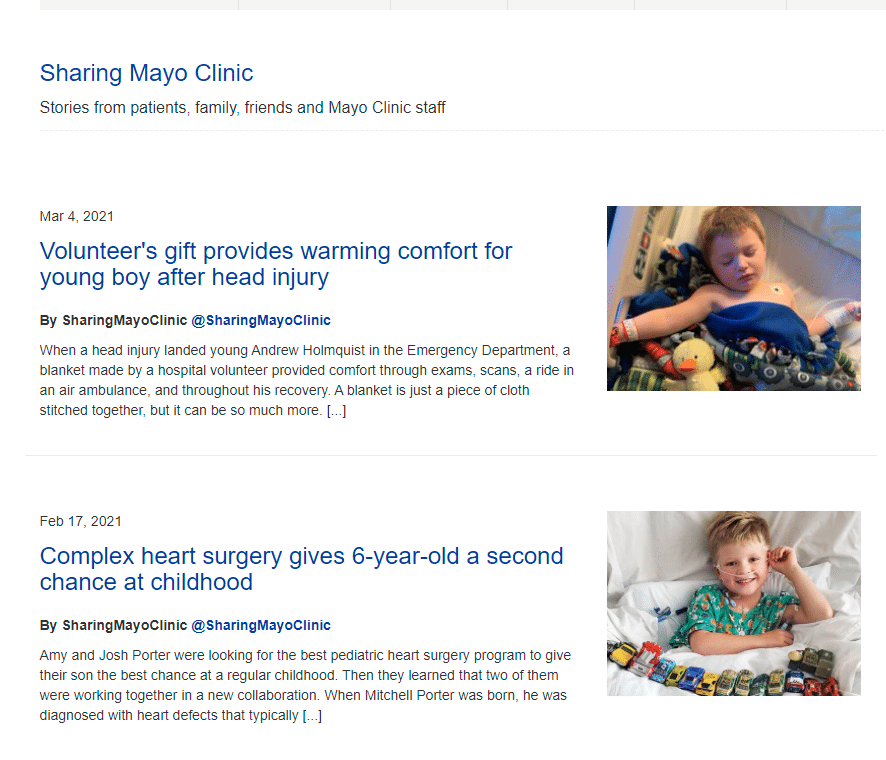
Mayo Clinic has also embraced interactive content to great success. The clinic’s symptom checker is the first step in many patients’ journeys to seeking medical care. The symptom checker guides users towards the clinic’s medical conditions information pages, which include subtle CTA’s to their products and services. But, more importantly, it can instantly provide the information that the user is looking for, building trust with each visit.
Northwell Health
New York network of hospitals and clinic, Northwell Health, is relatively new on the healthcare scene, but they’ve already made huge progress in distinguishing themselves from the competition, largely due to their well-planned digital marketing strategy.
Northwell’s content marketing strategy centers around its content hub – The Well – which aims to answer common patient questions much in the same way as Cleveland Clinic’s content strategy.
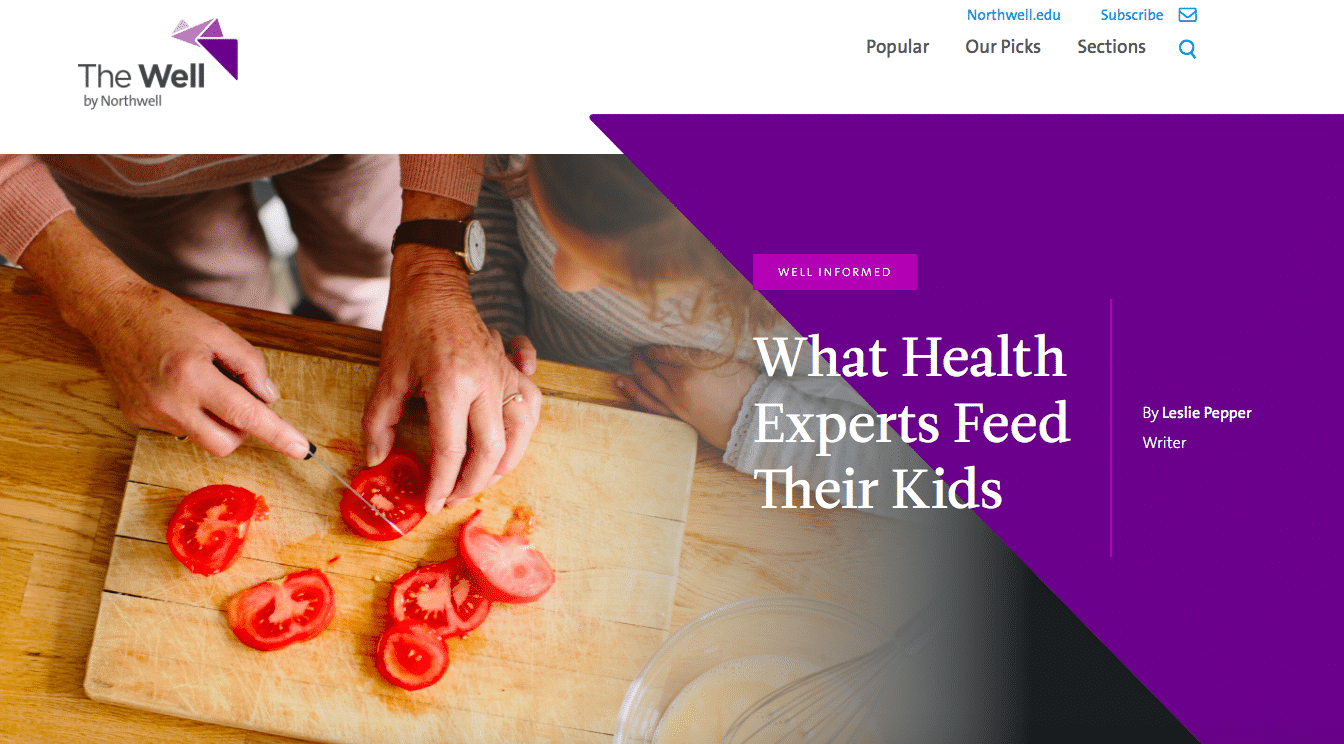
The blog directly answers questions such as “What happens during labor contractions” and “What are the early warning signs of Parkinson’s disease?” as well as more general informational content such as how an ER is run and what to expect on your first trip to the gynecologist.
Some of the blog’s most popular content is true stories provided by Northwell’s own patients. Articles such as “I Survived a Brain Aneurysm” are both compelling and effectively showcasing the clinic’s services and their commitment to patients. At the end of the article, readers are invited to learn more about the chief surgeon in charge of neurosurgery at one of the group’s hospitals, read more about brain aneurysm, or to schedule an appointment.
Northwell Health is also pioneering healthcare integration with voice search. Their integration with Alexa provides instant information about emergency department wait times and location information for emergency care in the area.
GE Healthcare
GE Reports for healthcare uses a lot of storytelling in its content. They include real stories from patients and experts. They also have unique angles when talking about products (they provide equipment for radiology needs). One recent blog article has the title of “Hocus Pocus: Revealing the Magic of Ultrasound,” which is much more accessible than using highly technical language. Their tone and mix of content are smart and on point. You can easily apply some of their principles to what you’re doing.
Epic Systems
Epic is a powerhouse in healthcare IT. They have a strong position in the industry as a thought leader. They also have a minimal presence on social media, but when you visit their website, it’s a very well-curated content hub.

They have stories on patient experiences, topical subjects around COVID-19, success stories of their work with hospitals, and other feel-good articles. While their website isn’t as “slick” as some in the tech world, it is content-first. Their products and services play a supporting role to educational and informational content.
HIMSS
HIMSS (Healthcare Information and Management Systems Society) is a big name in healthcare technology. It’s the largest not-for-profit organization that focuses on this segment. It’s a trustworthy source for providers, payors, and vendors.
Their research center reaches out to all stakeholders. It’s filled with content corroborated by data and research. It hits many topics that all players in that ecosystem can derive value from. Their content also features a lot of storytelling and examples so that the ideas are more tangible.
Want to Boost Your Healthcare Content Marketing Efforts?
If you’re a healthcare organization that wants to prioritize content to invigorate your business, improve thought leadership, or any other goal, you’ll need support to develop content. We can help!
If you are ready to get more traffic to your healthcare company website with timely, high-quality content that’s consistently published, check out our Content Builder Service. Set up a quick consultation, and I’ll send you a free PDF version of my books. Get started today and generate more patient leads per day!


![How to Create Effective Thought Leadership Content [Examples Included]](https://marketinginsidergroup.com/wp-content/uploads/2023/09/Screenshot-2023-08-29-at-11.07.57-AM.png)
![How to Create Content for Boring Industries [with Riveting Examples]](https://marketinginsidergroup.com/wp-content/uploads/2022/02/MIG-Feature-Image-Template-2023-12-13T160746.826.png)


